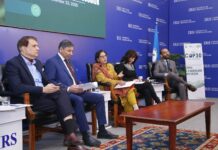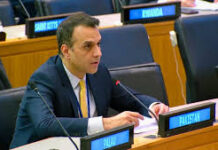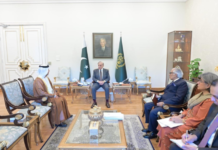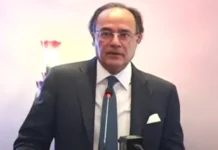 https://twitter.com/home https://www.facebook.com/Shabbir.Hussain191
https://twitter.com/home https://www.facebook.com/Shabbir.Hussain191By Shabbir Hussain
LAHORE, Aug 26 (Alliance News): UNICEF International Consultant Ms. Illse visited the Child Protection & Welfare Bureau (CPWB) Punjab on Monday and held a detailed meeting with Chairperson Sarah Ahmad to discuss child protection, case management, and system strengthening for vulnerable children across the province.
The meeting, which also included CPWB officials Ms. Zahida and Ms. Hafsa, focused on reviewing current child protection mechanisms, identifying challenges, and exploring new ways of enhancing coordination between government institutions and international partners like UNICEF.
Chairperson Sarah Ahmad welcomed the UNICEF consultant and briefed her on CPWB’s ongoing initiatives, particularly in the rehabilitation, education, and reintegration of at-risk children.
She highlighted Punjab’s growing child protection needs, stressing the urgency of collaborative strategies to safeguard the rights of children who remain vulnerable to abuse, neglect, and exploitation.
“We had a constructive meeting with UNICEF International Consultant Ms. Illse at the Child Protection & Welfare Bureau, Punjab,” Sarah Ahmad said after the meeting.
“As Chairperson of CPWB, I remain deeply committed to ensuring the protection, rehabilitation, and well-being of vulnerable children across Punjab. Together, with the support of partners like UNICEF, we can continue building a safer and brighter future for our children.”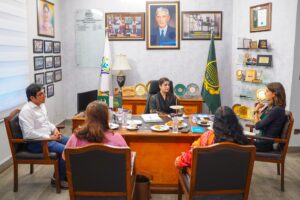
Focus on Case Management and Protection Systems
During the discussions, the delegation explored the importance of effective case management systems to track, monitor, and respond to the diverse needs of children.
Ms. Illse emphasized UNICEF’s readiness to support Pakistan in strengthening technical expertise, digital monitoring tools, and staff capacity building to ensure children in crisis situations receive timely protection and rehabilitation.
Sarah Ahmad noted that Punjab has witnessed multiple cases where immediate intervention saved children from violence, bonded labor, and trafficking.
She pointed out that CPWB, with UNICEF’s technical support, is working toward integrating a comprehensive case management framework to avoid delays in rescue operations, rehabilitation, and social reintegration.
“Every child deserves to be protected from harm,” she said. “Our systems must not only rescue children but also provide long-term rehabilitation opportunities so they can rebuild their lives with dignity.”
Strengthening Collaboration Between CPWB and UNICEF
The visit marked another step in the growing partnership between CPWB and UNICEF in Pakistan. Both institutions have previously collaborated on awareness campaigns, psychosocial support programs, and training sessions for frontline child protection staff.
Ms. Illse, acknowledging Punjab’s progress in this area, reaffirmed UNICEF’s commitment to supporting CPWB’s work at policy and operational levels.
She noted that effective coordination between government bodies and international partners is vital for strengthening institutional capacity.
“We are encouraged by the dedication of CPWB and its leadership,” Ms. Illse said. “Protecting children requires a multi-sectoral approach, and UNICEF remains committed to working with Punjab to ensure children’s rights are protected at every level.”
Challenges and Way Forward
Both sides also discussed persistent challenges such as street children, child beggary, domestic labor, and cases of trafficking that demand urgent interventions.
Sarah Ahmad underlined that CPWB has been actively rescuing street children and providing them with shelter, education, and rehabilitation.
However, she stressed the need for stronger legislation, resources, and continuous training for staff.
She further pointed out that public awareness campaigns remain essential to change community perceptions and encourage reporting of child abuse cases. “Our success depends on the active involvement of communities, parents, and institutions.
Protecting children is not just the government’s job—it is a collective responsibility,” Sarah Ahmad added.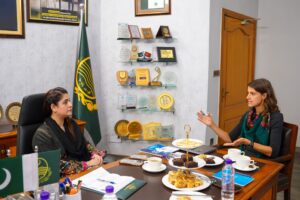
In response, Ms. Illse assured CPWB that UNICEF would explore additional areas of technical and financial support, including community-based prevention programs, psychological counseling services, and legal aid for children facing exploitation.
Broader Impact and Future Prospects
The CPWB in Punjab has emerged as a leading institution in Pakistan for child protection, playing a crucial role in rescuing thousands of children from hazardous environments.
Its collaboration with UNICEF adds international expertise and experience, enabling the bureau to align its policies with global standards on child rights and protection.
Looking ahead, both sides agreed to develop a roadmap for joint initiatives aimed at strengthening data-driven decision-making, digital case tracking, and multi-stakeholder engagement.
Special emphasis will be placed on reintegration of rescued children into mainstream education and vocational training programs to prepare them for independent and dignified lives.
Chairperson Sarah Ahmad concluded the meeting with a note of optimism. “This partnership is a beacon of hope for vulnerable children.
With consistent efforts and international collaboration, Punjab can set an example for the entire region in child protection and welfare.”


